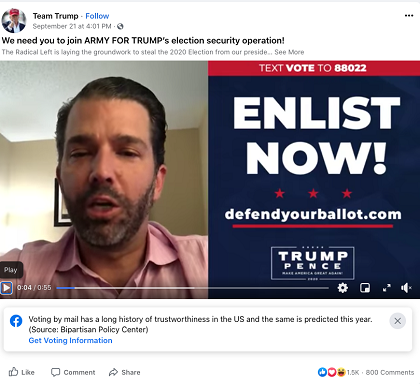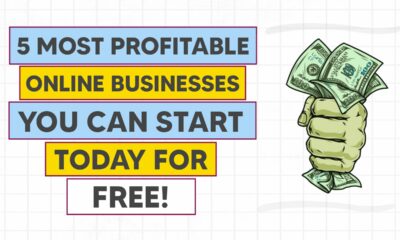SOCIAL
Is Facebook Bad for Society? New Insights on the Company’s Approach Raise Important Questions

Is Facebook a positive or negative influence on society – and does the company, or indeed anybody in a position to enact any type of change, actually care either way?
This question has been posed by many research reports and academic analyses over the years, but seemingly, the broader populous, at least in Western nations, really hadn’t give it a lot of consideration until the 2016 US Presidential Election, when it was revealed, in the aftermath, that foreign operatives, political activists and other groups had been using Facebook ads, posts and groups to influence US voter activity.
Suddenly, many realized that they may well have been manipulated, and while The Social Network has now implemented many more safeguards and detection measures to combat ‘coordinated inauthentic behavior’ by such groups, the concern is that this may not be enough, and it could be too late to stop the dangerous impact that Facebook has had, and is having, on society overall.
Facebook’s original motto of ‘move fast and break things‘ could, indeed, break society as we know it. That may seem alarmist, but the evidence is becoming increasingly clear.
Moving Fast
The launch of Facebook’s News Feed in September 2006 was a landmark moment for social media, providing a new way for people to engage with social platforms, and eventually, for the platforms themselves to better facilitate user engagement by highlighting the posts of most interest to users.
At that time, Facebook was only just starting to gain momentum, with 12 million total users, though that was already more than double its total audience count from the previous year. Facebook was also slowly consuming the audience of previous social media leader MySpace, and by 2007, with 20 million users, Facebook was already working on the next stage, and how it could keep people more engaged and glued to its app.
It introduced the Like button in 2007, which gave users a more implicit means to indicate their interest in a post or Page, and then in 2009, it rolled out the News Feed algorithm, which took into account various user behaviors and used them to define the order in which posts would appear in each individual’s feed – which, again, focused on making the platform more addictive, and more compelling.
And it worked – Facebook usage continued to rise, and on-platform engagement skyrocketed, and by the end of 2009, Facebook had more than 350 million total users. It almost doubled that again by the end of 2010, while it hit a billion total users in 2012. Clearly, the algorithm approach was working as intended – but again, in reference to Facebook’s creed at the time, while it was moving fast, it was almost certainly already breaking things in the process.
Though what, exactly, was being broken was not clear at that stage.
This week, in a statement to a House Commerce subcommittee hearing on how social media platforms contribute to the mainstreaming of extremist and radicalizing content, former Facebook director of monetization Tim Kendall has criticized the tactics that the company used within its growth process, and continues to employ today, which essentially put massive emphasis on maximizing user engagement, and largely ignore the potential consequences of that approach.
As per Kendall (via Ars Technica):
“The social media services that I and others have built over the past 15 years have served to tear people apart with alarming speed and intensity. At the very least, we have eroded our collective understanding – at worst, I fear we are pushing ourselves to the brink of a civil war.”
Which seems alarmist, right? How could a couple of Likes on Facebook lead us to the brink of civil war?
But that reality could actually be closer than many expect – for example, this week, US President Donald Trump has once again reiterated that he cannot guarantee a peaceful transfer of power in the event of him losing the November election. Trump says that because the polling process is flawed, he can’t say that he’ll respect the final decision – though various investigations have debunked Trump’s claims that mail-in ballots are riddled with fraud and will be used by his opponents to rig the final result.
Trump’s stance, in itself, is not overly surprising, but the concern now is that he could use his massive social media presence to mobilize his passionate supporter base in order to fight back against this perceived fraud if he disagrees with the result.
Indeed, this week, Trump’s son Don Jnr has been calling on Trump supporters to mobilize an ‘army’ to protect the election, which many see as a call to arms, and potential violence, designed to intimidate voters.

Note where this has been posted – while President Trump has a massive social media following across all the major platforms, Facebook is where he has seen the most success in connecting with his supporters and igniting their passions, by focusing on key pain points and divisive topics in order to reinforce support for the Republican agenda among voter groups.
Why does that seemingly resonate more on Facebook than other platforms?
Because Facebook prioritizes engagement over all else, and posts that generate a lot of comments and discussion get more traction, and thereby get more distribution via Facebook’s algorithm. Facebook also offers complex ad targeting options which have enabled the Trump campaign to hone in on specific pain points and concerns for each group.

By using custom audiences, the Trump campaign is able to press on the key issues of concern to each specific audience subset, more effectively than it can on other platforms, which then exacerbates specific fears and prompts support for the Trump agenda.
How you view that approach comes down to your individual perspective, but the net result is that Facebook essentially facilitates more division and angst by amplifying and reinforcing such through its News Feed distribution. Because it focuses on engagement, and keeping users on Facebook – and the way to do that, evidently, is by highlighting debate and sparking discussion, no matter how healthy or not the subsequent interaction may be.
It’s clearly proven to be an effective approach for Facebook over time, and now also the Trump campaign. But it could also, as noted by Kendall, lead to something far worse as a result.
Civil Unrest
But it’s not just in the US that this has happened, and the Trump campaign is not the first to utilize Facebook’s systems in this way.
For example, in Myanmar back in 2014, a post circulated on Facebook which falsely accused a Mandalay business owner of raping a female employee. That post lead to the gathering of a mob, which eventually lead to civil unrest. The original accusation in this instance was incorrect, but Facebook’s vast distribution in the region enabled it to grow quickly, beyond the control of authorities.
In regions like Myanmar, which are still catching up with the western world in technical capacity, Facebook has become a key connector, an essential tool for distributing information and keeping people up to date. But the capability for anyone to have their say, on anything, can lead to negative impacts – with news and information coming from unofficial, unverified sources, messages can be misconstrued, misunderstood, and untrue claims are able to gain massive traction, without proper checks and balances in place.
We’ve seen similar in the growth of pseudoscience and conspiracy theories in western regions – the growth of the anti-vax movement, for example, is largely attributed to Facebook distribution.

As you can see in this chart, using Google Trends data, searches for ‘anti-vax’ have gained significant momentum over the last decade, and while some of that is attributable to the terms used (people may not have always referred to ‘anti-vax’), it is clear that this counter-science movement has gained significant traction in line with the rise of The Social Network.
Is that coincidence, or could it be that by allowing everyone to have such huge potential reach with their comments, Facebook has effectively amplified the anti-vax movement, and others, because the debate around such sparks conversation and prompts debate?
That, essentially, is what’s Facebook’s News Feed is built upon, maximizing the distribution of on-platform discussions that trigger engagement.
As further explained by Kendall:
“We initially used engagement as sort of a proxy for user benefit, but we also started to realize that engagement could also mean [users] were sufficiently sucked in that they couldn’t work in their own best long-term interest to get off the platform. We started to see real-life consequences, but they weren’t given much weight. Engagement always won, it always trumped.”
Again, Facebook’s race to maximize engagement may indeed have lead to things being broken, but various reports from insiders suggest Facebook didn’t consider those expanded consequences.
And why would it? Facebook was succeeding, making money, building a massive empire. And it also, seemingly, gives people what they want. Some would argue that this is the right approach – adults should be free to decide what they read, what they engage with, and if that happens to be news and information that runs counter to the ‘official narrative’, then so be it.
Which is fine, so long as there are no major consequences. Like, say, the need to be vaccinated to stop the spread of a global pandemic.
Real World Consequence
This is where things get even more complex, and Facebook’s influence requires further scrutiny.
As per The New York Times:
“A poll in May by The Associated Press-NORC Center for Public Affairs Research found that only about half of Americans said they would be willing to get a coronavirus vaccine. One in five said they would refuse and 31 percent were uncertain.”
US medical leader Dr Anthony Fauci has also highlighted the same concern, noting that “general anti-science, anti-authority, anti-vaccine feeling” is likely to thwart vaccination efforts in the nation.
Of course, the anti-vax movement can’t purely be linked back to Facebook, but again, the evidence suggests that the platform has played a key role in amplifying such in favor of engagement. That could see some regions take far longer than necessary to recover from the COVID-19 pandemic, so while the debate itself may seem relatively limited – and Facebook had allowed anti-vax content on its platform till last year, when it took steps to remove it – the actual consequences can be significant. And this is just one example.
The QAnon conspiracy theory had also been allowed to gain traction on The Social Network, before Facebook took steps to remove such last month, the violent ‘boogaloo’ movement saw mass engagement on the platform till Facebook announced new rules against such back in June, while climate change debates have been allowed to continue on the platform under the guise of opinion. In each case, Facebook had been warned for years of the potential for harm, but the company failed to act until there was significant pressure from outside groups, which forced its response.
Is that because Facebook didn’t consider these as significant threats, or because it prioritized engagement? It’s impossible to say, but clearly, by allowing such to continue, Facebook benefits from the related discussion and interaction on its platform.
The history shows that Facebook is far too reactive in these cases, responding after the damage is done with apologies and pledges to improve.
Again, as noted by Kendall:
“There’s no incentive to stop [toxic content] and there’s incredible incentive to keep going and get better. I just don’t believe that’s going to change unless there are financial, civil, or criminal penalties associated with the harm that they create. Without enforcement, they’re just going to continue to be embarrassed by the mistakes, and they’ll talk about empty platitudes… but I don’t believe anything systemic will change… the incentives to keep the status quo are just too lucrative at the moment.”
This is where the true conflict of open distribution platforms arises. Yes, it can be beneficial to give everyone a chance to have their say, to share their voice with the world. But where do you draw the line on such?
Facebook CEO Mark Zuckerberg could clearly prefer for Facebook not to intervene:
“People having the power to express themselves at scale is a new kind of force in the world — a Fifth Estate alongside the other power structures of society. People no longer have to rely on traditional gatekeepers in politics or media to make their voices heard, and that has important consequences. I understand the concerns about how tech platforms have centralized power, but I actually believe the much bigger story is how much these platforms have decentralized power by putting it directly into people’s hands. It’s part of this amazing expansion of voice through law, culture and technology.”
And that may reveal the biggest true flaw in Facebook’s approach. The company leans too far towards optimism, so much so that it seemingly ignores the potential damage that such can also cause. Zuckerberg would prefer to believe that people are fundamentally good, and we, as a society, can come together, through combined voice, to talk it out and come to the best conclusion.
The available evidence suggests that’s not what happens. The loudest voices win, the most divisive get the most attention. And Facebook benefits by amplifying argument and disagreement.
This is a key concern of the modern age, and while many still dismiss the suggestion that a simple social media app, where people Like each others’ holiday snaps and keep tabs on their ex-classmates, can have serious impacts on the future of society, the case, when laid out, is fairly plain to see.
Investigations into such are now taking on a more serious tone, and the 2020 Election will be a key inflection point. After that, we may well see a new shift in Facebook’s approach – but the question is, will that, once again, prove too late?
SOCIAL
12 Proven Methods to Make Money Blogging in 2024

 This is a contributed article.
This is a contributed article.
The world of blogging continues to thrive in 2024, offering a compelling avenue for creative minds to share their knowledge, build an audience, and even turn their passion into profit. Whether you’re a seasoned blogger or just starting, there are numerous effective strategies to monetize your blog and achieve financial success. Here, we delve into 12 proven methods to make money blogging in 2024:
1. Embrace Niche Expertise:
Standing out in the vast blogosphere requires focus. Carving a niche allows you to cater to a specific audience with targeted content. This not only builds a loyal following but also positions you as an authority in your chosen field. Whether it’s gardening techniques, travel hacking tips, or the intricacies of cryptocurrency, delve deep into a subject you’re passionate and knowledgeable about. Targeted audiences are more receptive to monetization efforts, making them ideal for success.
2. Content is King (and Queen):
High-quality content remains the cornerstone of any successful blog. In 2024, readers crave informative, engaging, and well-written content that solves their problems, answers their questions, or entertains them. Invest time in crafting valuable blog posts, articles, or videos that resonate with your target audience.
- Focus on evergreen content: Create content that remains relevant for a long time, attracting consistent traffic and boosting your earning potential.
- Incorporate multimedia: Spice up your content with captivating images, infographics, or even videos to enhance reader engagement and improve SEO.
- Maintain consistency: Develop a regular publishing schedule to build anticipation and keep your audience coming back for more.
3. The Power of SEO:
Search Engine Optimization (SEO) ensures your blog ranks high in search engine results for relevant keywords. This increases organic traffic, the lifeblood of any monetization strategy.
- Keyword research: Use keyword research tools to identify terms your target audience searches for. Strategically incorporate these keywords into your content naturally.
- Technical SEO: Optimize your blog’s loading speed, mobile responsiveness, and overall technical aspects to improve search engine ranking.
- Backlink building: Encourage other websites to link back to your content, boosting your blog’s authority in the eyes of search engines.
4. Monetization Magic: Affiliate Marketing
Affiliate marketing allows you to earn commissions by promoting other companies’ products or services. When a reader clicks on your affiliate link and makes a purchase, you get a commission.
- Choose relevant affiliates: Promote products or services that align with your niche and resonate with your audience.
- Transparency is key: Disclose your affiliate relationships clearly to your readers and build trust.
- Integrate strategically: Don’t just bombard readers with links. Weave affiliate promotions naturally into your content, highlighting the value proposition.
5. Display Advertising: A Classic Approach
Display advertising involves placing banner ads, text ads, or other visual elements on your blog. When a reader clicks on an ad, you earn revenue.
- Choose reputable ad networks: Partner with established ad networks that offer competitive rates and relevant ads for your audience.
- Strategic ad placement: Place ads thoughtfully, avoiding an overwhelming experience for readers.
- Track your performance: Monitor ad clicks and conversions to measure the effectiveness of your ad placements and optimize for better results.
6. Offer Premium Content:
Providing exclusive, in-depth content behind a paywall can generate additional income. This could be premium blog posts, ebooks, online courses, or webinars.
- Deliver exceptional value: Ensure your premium content offers significant value that justifies the price tag.
- Multiple pricing options: Consider offering tiered subscription plans to cater to different audience needs and budgets.
- Promote effectively: Highlight the benefits of your premium content and encourage readers to subscribe.
7. Coaching and Consulting:
Leverage your expertise by offering coaching or consulting services related to your niche. Readers who find your content valuable may be interested in personalized guidance.
- Position yourself as an expert: Showcase your qualifications, experience, and client testimonials to build trust and establish your credibility.
- Offer free consultations: Provide a limited free consultation to potential clients, allowing them to experience your expertise firsthand.
- Develop clear packages: Outline different coaching or consulting packages with varying time commitments and pricing structures.
8. The Power of Community: Online Events and Webinars
Host online events or webinars related to your niche. These events offer valuable content while also providing an opportunity to promote other monetization avenues.
- Interactive and engaging: Structure your online events to be interactive with polls, Q&A sessions, or live chats. Click here to learn more about image marketing with Q&A sessions and live chats.
9. Embrace the Power of Email Marketing:
Building an email list allows you to foster stronger relationships with your audience and promote your content and offerings directly.
- Offer valuable incentives: Encourage readers to subscribe by offering exclusive content, discounts, or early access to new products.
- Segmentation is key: Segment your email list based on reader interests to send targeted campaigns that resonate more effectively.
- Regular communication: Maintain consistent communication with your subscribers through engaging newsletters or updates.
10. Sell Your Own Products:
Take your expertise to the next level by creating and selling your own products. This could be physical merchandise, digital downloads, or even printables related to your niche.
- Identify audience needs: Develop products that address the specific needs and desires of your target audience.
- High-quality offerings: Invest in creating high-quality products that offer exceptional value and user experience.
- Utilize multiple platforms: Sell your products through your blog, online marketplaces, or even social media platforms.
11. Sponsorships and Brand Collaborations:
Partner with brands or businesses relevant to your niche for sponsored content or collaborations. This can be a lucrative way to leverage your audience and generate income.
- Maintain editorial control: While working with sponsors, ensure you retain editorial control to maintain your blog’s authenticity and audience trust.
- Disclosures are essential: Clearly disclose sponsored content to readers, upholding transparency and ethical practices.
- Align with your niche: Partner with brands that complement your content and resonate with your audience.
12. Freelancing and Paid Writing Opportunities:
Your blog can serve as a springboard for freelance writing opportunities. Showcase your writing skills and expertise through your blog content, attracting potential clients.
- Target relevant publications: Identify online publications, websites, or magazines related to your niche and pitch your writing services.
- High-quality samples: Include high-quality blog posts from your site as writing samples when pitching to potential clients.
- Develop strong writing skills: Continuously hone your writing skills and stay updated on current trends in your niche to deliver exceptional work.
Conclusion:
Building a successful blog that generates income requires dedication, strategic planning, and high-quality content. In today’s digital age, there are numerous opportunities to make money online through blogging. By utilizing a combination of methods such as affiliate marketing, sponsored content, and selling digital products or services, you can leverage your blog’s potential and achieve financial success.
Remember, consistency in posting, engaging with your audience, and staying adaptable to trends are key to thriving in the ever-evolving blogosphere. Embrace new strategies, refine your approaches, and always keep your readers at the forefront of your content creation journey. With dedication and the right approach, your blog has the potential to become a valuable source of income and a platform for sharing your knowledge and passion with the world, making money online while doing what you love.
Image Credit: DepositPhotos
SOCIAL
Snapchat Explores New Messaging Retention Feature: A Game-Changer or Risky Move?

In a recent announcement, Snapchat revealed a groundbreaking update that challenges its traditional design ethos. The platform is experimenting with an option that allows users to defy the 24-hour auto-delete rule, a feature synonymous with Snapchat’s ephemeral messaging model.
The proposed change aims to introduce a “Never delete” option in messaging retention settings, aligning Snapchat more closely with conventional messaging apps. While this move may blur Snapchat’s distinctive selling point, Snap appears convinced of its necessity.
According to Snap, the decision stems from user feedback and a commitment to innovation based on user needs. The company aims to provide greater flexibility and control over conversations, catering to the preferences of its community.
Currently undergoing trials in select markets, the new feature empowers users to adjust retention settings on a conversation-by-conversation basis. Flexibility remains paramount, with participants able to modify settings within chats and receive in-chat notifications to ensure transparency.
Snapchat underscores that the default auto-delete feature will persist, reinforcing its design philosophy centered on ephemerality. However, with the app gaining traction as a primary messaging platform, the option offers users a means to preserve longer chat histories.
The update marks a pivotal moment for Snapchat, renowned for its disappearing message premise, especially popular among younger demographics. Retaining this focus has been pivotal to Snapchat’s identity, but the shift suggests a broader strategy aimed at diversifying its user base.
This strategy may appeal particularly to older demographics, potentially extending Snapchat’s relevance as users age. By emulating features of conventional messaging platforms, Snapchat seeks to enhance its appeal and broaden its reach.
Yet, the introduction of message retention poses questions about Snapchat’s uniqueness. While addressing user demands, the risk of diluting Snapchat’s distinctiveness looms large.
As Snapchat ventures into uncharted territory, the outcome of this experiment remains uncertain. Will message retention propel Snapchat to new heights, or will it compromise the platform’s uniqueness?
Only time will tell.
SOCIAL
Catering to specific audience boosts your business, says accountant turned coach

While it is tempting to try to appeal to a broad audience, the founder of alcohol-free coaching service Just the Tonic, Sandra Parker, believes the best thing you can do for your business is focus on your niche. Here’s how she did just that.
When running a business, reaching out to as many clients as possible can be tempting. But it also risks making your marketing “too generic,” warns Sandra Parker, the founder of Just The Tonic Coaching.
“From the very start of my business, I knew exactly who I could help and who I couldn’t,” Parker told My Biggest Lessons.
Parker struggled with alcohol dependence as a young professional. Today, her business targets high-achieving individuals who face challenges similar to those she had early in her career.
“I understand their frustrations, I understand their fears, and I understand their coping mechanisms and the stories they’re telling themselves,” Parker said. “Because of that, I’m able to market very effectively, to speak in a language that they understand, and am able to reach them.”Â
“I believe that it’s really important that you know exactly who your customer or your client is, and you target them, and you resist the temptation to make your marketing too generic to try and reach everyone,” she explained.
“If you speak specifically to your target clients, you will reach them, and I believe that’s the way that you’re going to be more successful.
Watch the video for more of Sandra Parker’s biggest lessons.
-

 AI3 days ago
AI3 days agoHow AI is Transforming SEO and What Website Owners Need to Know
-

 SEARCHENGINES7 days ago
SEARCHENGINES7 days agoGoogle Ranking Movement, Sitelinks Search Box Going Away, Gen-AI In Bing & Google, Ad News & More
-

 WORDPRESS6 days ago
WORDPRESS6 days ago5 Most Profitable Online Businesses You Can Start Today for Free!
-

 WORDPRESS6 days ago
WORDPRESS6 days agoAutomattic demanded web host pay $32M annually for using WordPress trademark
-

 SEARCHENGINES6 days ago
SEARCHENGINES6 days agoGoogle Search Ranking Volatility October 26th & 27th & 23rd & 24th
-

 SEO6 days ago
SEO6 days agoNew Google Trends SEO Documentation
-

 AFFILIATE MARKETING6 days ago
AFFILIATE MARKETING6 days agoCut Costs, Not Features with This Microsoft Bundle Deal
-

 WORDPRESS5 days ago
WORDPRESS5 days agoWP Engine sues WordPress co-creator Mullenweg and Automattic, alleging abuse of power



